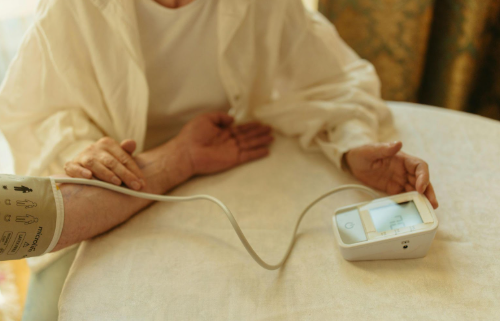In-Home Rehabilitation Services: Recovering Stronger with Home Health Care

Recovering from an illness, injury, or surgery can be challenging and often lengthy. Traditionally, patients would receive rehabilitation in hospitals or outpatient facilities. However, in-home rehabilitation services have become an effective option as they offer personalized, one-on-one care in the comfort and familiarity of the patient’s home.
Read on to learn the benefits of in-home rehabilitation, the services offered, and how
home health care supports recovery outcomes.
Benefits of In-Home Rehabilitation
In-home rehabilitation services offer numerous advantages, making it a preferred option for patients, particularly those requiring long-term care or mobility issues.
Personalized Care in a Familiar Setting
Patients often feel more relaxed and motivated when recovering at home, which can positively impact their physical and emotional well-being. Home health care professionals provide personalized care tailored to each patient's specific needs, adjusting therapy plans as necessary. This one-on-one attention ensures the patient receives a higher level of care than in a busy clinic or hospital setting.
Increased Comfort and Independence
Being at home offers patients a sense of control over their recovery. They can maintain their routines, sleep in their own bed, and be surrounded by family, which contributes to emotional support. Patients also experience increased independence in managing their daily activities, which is needed to foster long-term recovery and self-sufficiency. This level of comfort and independence is not as easily attainable in a traditional healthcare setting.
Reduced Risk of Infection
While essential for acute care, hospitals and outpatient clinics can expose patients to various infections, especially those with weakened immune systems. Home-based rehabilitation services significantly reduce the risk of hospital-acquired infections, promoting a safer recovery process. This is particularly important for older adults and those with chronic conditions who are at higher risk of developing complications during recovery.
Cost-Effective Care
In-home rehabilitation can be more cost-effective than prolonged hospital stays or frequent outpatient visits. Patients avoid the additional expenses associated with traveling to and from clinics, and in many cases, home health care can help reduce the need for readmissions. Insurance providers also recognize the benefits of in-home care, often covering these services, making it a financially viable option for many families.
Types of In-Home Rehabilitation Services
A personalized care plan is developed depending on the patient's needs to ensure the most effective recovery. Here are some common in-home rehabilitation services:
Physical Therapy
Physical therapy (PT) is designed to help patients regain mobility, strength, balance, and coordination after surgery, injury, or illness. Physical therapists work with patients to develop exercise routines tailored to their recovery needs. These exercises can include strength training, flexibility exercises, and balance exercises. PT is particularly helpful for individuals recovering from joint replacements, strokes, and injuries affecting movement and balance.
Occupational Therapy
Occupational therapy (OT) focuses on helping patients regain the ability to perform daily tasks that are necessary for independent living. Occupational therapists work with patients to develop strategies and adapt their environments to support tasks like dressing, cooking, bathing, and more. This type of therapy is especially beneficial for individuals who have suffered from strokes, traumatic injuries, or degenerative conditions that affect their ability to carry out daily functions.
Speech Therapy
Speech therapy is often necessary for individuals recovering from strokes, brain injuries, or conditions that affect speech and swallowing. Speech-language pathologists help patients regain their communication skills, both verbal and non-verbal, and improve swallowing function. In-home speech therapy is particularly effective because patients can practice these skills in a familiar environment where they regularly interact with family members and caregivers.
Wound Care Management
Proper wound care is essential for patients recovering from surgery or injuries to avoid infections and promote healing. Home health care professionals provide expert wound care management, ensuring that dressings are changed regularly and wounds are cleaned and monitored for signs of infection. This service is critical for individuals with chronic wounds, surgical wounds, or pressure ulcers.
Pain Management
Home health care providers assist with pain management strategies, including medication administration, physical therapy, and alternative pain relief techniques like heat therapy, cold therapy, and relaxation exercises. Proper pain management can help patients regain mobility and engage in rehabilitation exercises with less discomfort.
How In-Home Rehabilitation Promotes Faster Recovery
The key to successful rehabilitation lies in creating a recovery environment that motivates and empowers the patient. In-home rehabilitation fosters stronger outcomes for several reasons:
Continuity of Care
With in-home rehabilitation, patients often receive consistent care from the same healthcare professionals, building trust and rapport. This continuity of care allows healthcare providers to monitor progress closely, make timely adjustments to therapy plans, and provide the necessary support and encouragement. When patients know their caregivers and feel comfortable, they are more likely to adhere to their rehabilitation plans and achieve better results.
Family Involvement
In-home rehabilitation services encourage family involvement, allowing caregivers to participate in therapy sessions and learn how to support the patient’s needs. This collaborative approach makes sure that patients have support even when healthcare professionals are not present, enhancing the effectiveness of their therapy.
Real-Life Application
In-home rehabilitation offers the unique advantage of helping patients practice their therapy exercises and strategies in their own living environment. For example, occupational therapists may work with patients navigating stairs, preparing meals, or bathing in the home setting. This practical, real-world application of rehabilitation techniques can accelerate recovery as patients learn how to overcome daily challenges in their own space.
Emotional Well-Being
Recovering in the comfort of home, surrounded by familiar sights, sounds, and loved ones, can significantly improve a patient's emotional health. Reduced stress, anxiety, and depression positively influence physical healing. Home healthcare professionals also offer emotional support, motivating patients to stay engaged in their rehabilitation journey.
At
Five Star Home Health Care Agency, we offer comprehensive in-home rehabilitation services tailored to your recovery needs, ensuring a smooth and effective process.
Contact us to experience expert care and support at home, where healing begins.










